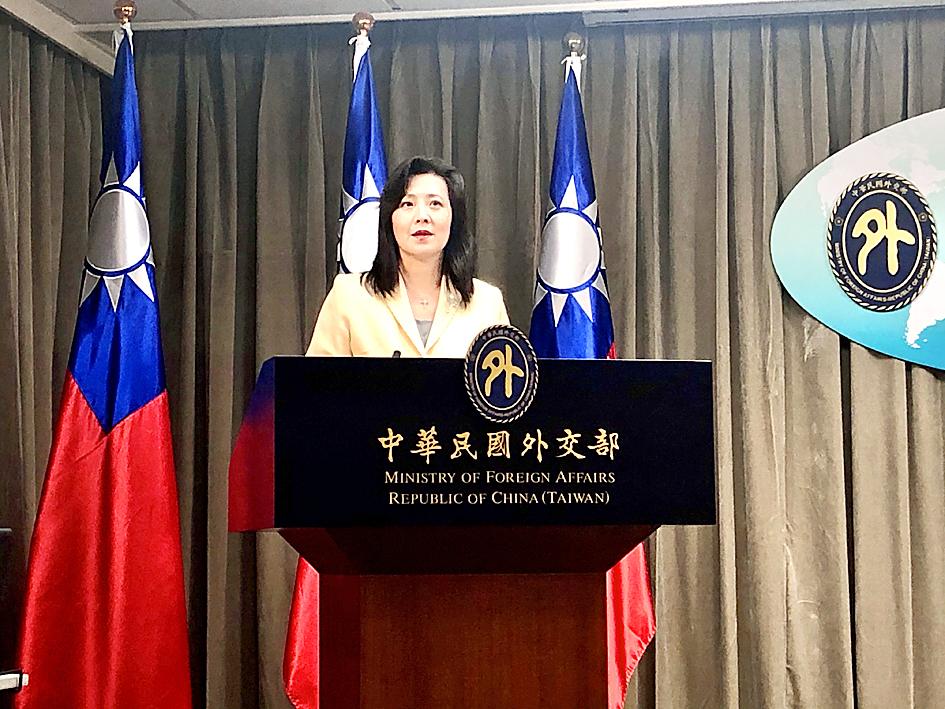The Ministry of Foreign Affairs (MOFA) yesterday extended its appreciation to Brazilian Deputy Paulo Eduardo Martins, who disclosed a letter from the Chinese embassy in Sao Paulo to local lawmakers demanding that they not congratulate President Tsai Ing-wen (蔡英文) on her inauguration on Wednesday last week.
In a tweet on Monday, Martins posted a photograph of the letter, which stated that the Brazilian Chamber of Deputies, the lower house of the Brazilian Congress, should respect its “one China” principle by not delivering any congratulatory remarks to Tsai’s second-term inauguration.
The disclosure sparked a series of posts on Twitter from Brazilians with the hashtag #VivaTaiwan, which means “long live Taiwan” in Portuguese, to show their backing for Taiwan and express concern over Beijing’s influence.

Photo: Lu Yi-hsuan, Taipei Times
It was one of the top three trending hashtags on Twitter on the day following Martin’s post.
Tsai on Tuesday used the hashtag to express her gratitude to Brazilian supporters of Taiwan.
“Thank you to all of our friends in #Brazil for your kind congratulations, and I hope you are all staying safe & healthy. #VivaTaiwan #VivaBrazil,” she tweeted.
Asked for comment during a news briefing in Taipei yesterday, ministry spokesperson Joanne Ou (歐江安) expressed her gratitude for Martins’ safeguarding of democratic values, as well as for his congratulatory remarks, adding that the ministry also thanks the Brazilian public for their support for Taiwan.
Freedom of speech is a fundamental human right, and democracy is a mutual value shared by Taiwan and Brazil, she said.
As of yesterday, 275 dignitaries from 49 nations and international organizations, including presidents, prime ministers and lawmakers, had sent congratulatory remarks to Tsai for her inauguration, she said.
As Brazil adheres to a one China policy, it does not have diplomatic relations with Taiwan, but the two nations maintain unofficial ties through representative offices.

Several Chinese Nationalist Party (KMT) officials including Chairman Eric Chu (朱立倫) are to be summoned for questioning and then transferred to prosecutors for holding an illegal assembly in Taipei last night, the Taipei Police said today. Chu and two others hosted an illegal assembly and are to be requested to explain their actions, the Taipei City Police Department's Zhongzheng (中正) First Precinct said, referring to a protest held after Huang Lu Chin-ju (黃呂錦茹), KMT Taipei's chapter director, and several other KMT staffers were questioned for alleged signature forgery in recall petitions against Democratic Progressive Party (DPP) legislators. Taipei prosecutors had filed

Taiwan would welcome the return of Honduras as a diplomatic ally if its next president decides to make such a move, Minister of Foreign Affairs Lin Chia-lung (林佳龍) said yesterday. “Of course, we would welcome Honduras if they want to restore diplomatic ties with Taiwan after their elections,” Lin said at a meeting of the legislature’s Foreign Affairs and National Defense Committee, when asked to comment on statements made by two of the three Honduran presidential candidates during the presidential campaign in the Central American country. Taiwan is paying close attention to the region as a whole in the wake of a

NEW WORLD: Taiwan is pursuing innovative approaches to international relations through economics, trade and values-based diplomacy, the foreign minister said Taiwan would implement a “three-chain strategy” that promotes democratic values in response to US tariffs, Minister of Foreign Affairs Lin Chia-lung (林佳龍) said. Taiwan would aim to create a “global democratic value chain,” seek to capitalize on its position within the first island chain and promote a “non-red supply chain,” Lin was quoted as saying in the ministry’s written report to the Legislative Yuan submitted ahead of the legislature’s Foreign Affairs and National Defense Committee meeting slated for today. The Ministry would also uphold a spirit of mutual beneficial collaboration, maintaining close communication and consultations with Washington to show that Taiwan-US cooperation

Taiwan and the US have begun trade negotiations over tariffs imposed by US President Donald Trump earlier this month, Minister of Foreign Affairs Lin Chia-lung (林佳龍) said in an interview this morning before reporting to the Legislative Yuan’s Foreign Affairs and National Defense Committee. The Taipei Economic and Cultural Representative Office (TECRO), Taiwan’s de facto embassy in the US, has already established communication channels with the US Department of State and the US Trade Representative (USTR), and is engaging in intensive consultations, he said. Points of negotiation include tariffs, non-tariff trade barriers and issues related to investment, procurement and export controls, he